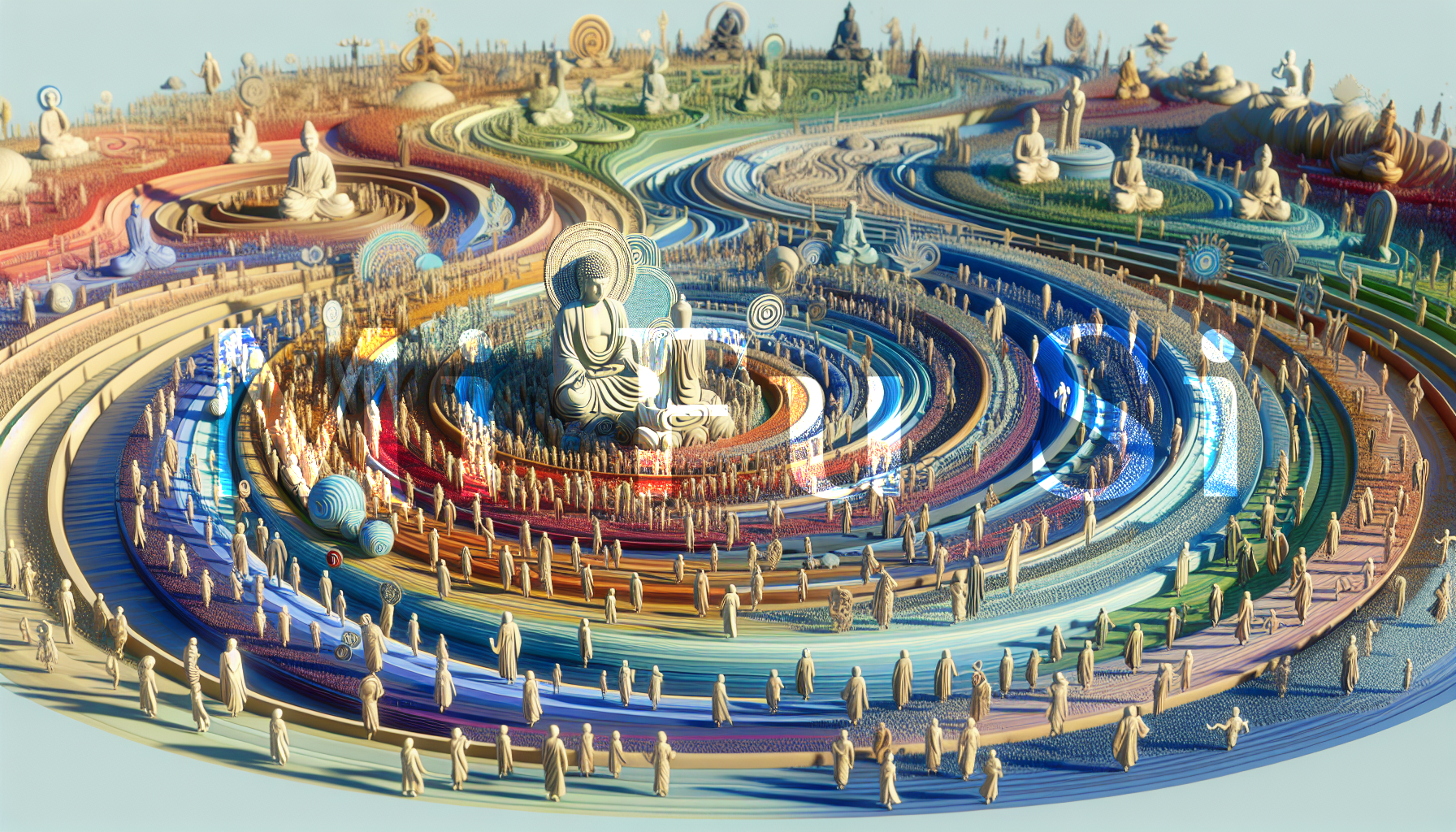Maitreya
The following text comes from the Cambodian Buddhist web site http://reksmay.webs.com/messagefrombuddhas.htm. I would like to hear your opinion of it. Thank you again for being my guide on the spiritual path of Mật Giáo.
“O, all ye Po-ti-satts and Maha Po-ti-satts, mark my words. Starting from this year forward, 2007, there will be much chaos as never seen before. Shakyamuni Gautoma Buddha had predicted about the decline of His religion. And let Me (Maitreya Buddha) explain to you why I am broadcasting My religion (Maitreya Buddhism) while in the process of saving Shakyamuni Gautoma Buddhism. Because Shakyamuni Gautoma had predicted the decline of His religion, you must believe in TWO religions (Gautoma and Maitreya’s) for you to find salvation. My (Shakyamuni Gautoma) Older Brother (Maitreya) will come to save my religion. How will you recognize Him? You will recognize Him in the land called Nokor Kauk Thloak or Cambodia. You will see huge temples erected in additition to the Buddha Statues. Flock to Him, and you will find salvation. Get on His Dharma Ship and you will The reason why I (Maitreya Buddha) am telling you is because starting this year, 2007, Devadatta (Shakyamuni Gautoma’s cousin, His arch enemy) is finally released from hell. He will take with him 13 million demons (asurakais) and he will spread his religion called Devadatta sasana, a religion of darkness. I (Maitreya Buddha) will not focus much on Buddhist followers, but as you can see other religions are fighting each other. These demons will enter the minds of individuals without Dharma all over the world and made them kill and ultimately commit suicide. Mark my words. Because of this reason, I urge you to keep the lucky charms that you have “bought” from my excavations in the woods of Cambodia close with you at all times. Make prayers to the Angels guarding the charms to protect you. This is all you could do.
When the land called Huan Norng (?) or Thailand has depleted itself with the enlightened beings, there will be such catastrophy you can only imagine. Thailand has become well and prosperous because they have captured the enlightened beings of Cambodia. Preah Ko or Preah Enn Tereik rebirth and Preah Keo or Preah Se-Ah Maitrei rebirth were captured by the Thais about 500 years ago. While Preah Ko was trapped in the enchanted spell of binding by the Thais, Preah Keo was not. Preah Keo escaped to Heaven and stayed for a while until recently. He came back to Nokor Hunon or Khmer to begin His mission to save Shakyamuni Gautoma Buddha’s religion. O, ye Preah Po-ti-satts and Maha Preah Po-ti-satts, when you see someone in Cambodia building lots of temples and Buddhas Statues, that person is the Enlightened Being—The Buddha to be. Go to Him and support Him and you will get your wishes answered.
When Thailand has depleted itself of the enlightened beings, world catastrophy will ensue. When that time comes, cling close to the Dharma Ship of Maitreya Buddha and you will be saved. Shakyamuni Gautoma Buddhism cannot be well because My (Gautoma) deciples have embarrassed Me. When the monks wearing the monk’s robes started stealing and cheating and killing, etc…, they are false holy people. They have taken My Dharma and stamped them under their feet. In a few short time in the future, there will be no more monk’s robes to wear. And the lights of My Dharma will dwindle with it. Those who consider themselves monks will only have a piece of saffron-colored fabric thuck above their ears. Perform good deeds to these holy people and you will get merits. That is why I asked you all to take on Maitreya Buddhism (My Older Brother’s) so that He can help save you.”
The workings of heaven are invisible to us. We here on earth don’t see the real “heavenly officials” doing their work. Instead, we create representative images, which we call deities, or Gods, or Buddhas. We use these images as “intermediaries” to pray to, to worship, and to place our faith in.
This is all well and good, a method that makes it possible for us mere humans to lead spiritual lives, to have a sense of the infinite. But it can also lead to problems, as when false prophets, messiahs or “living Buddhas” proclaim themselves to be the true representatives of heaven, to be speaking the word of God. At any given time, there are many of these false prophets running around, spreading their lies, drawing in the gullible and desperate as disciples. These days, Maitreya appears to be a very popular figure — if you do a search for “Maitreya” on the internet, you’ll find at least half a dozen — some even claiming to be Christian or Muslim versions of “the promised one.” Don’t fall for these phonies — heaven is not in the business of sending representatives to earth to preach their own warped version of “the truth.”
In studying religion we must think for ourselves, and should not be attached — to things, people, relationships, situations, we should not caught up in clinging to an image of a god, or a saviour, or even a Buddha. This can only lead to the illusion that “my god is the real god, yours is false” or “unless you embrace my religion, you are doomed to hell.” And as we have seen, such false beliefs lead to war, terrorism, “ethnic cleansing” and other atrocities.
RUNNING AMOK
(Hiện tượng tẩu hỏa nhập ma by oneway on Thu Apr 08, 2010 2:00 pm, translated by Horangi)
The following is the meaning of the T.T encounter with the woman calling herself “Vajra Boddhisattvav”, I hope that T.T can get some experiences from this lesson (coming from the Spirits). One of the principle in mysticism (supernatural laws) is that you always have to check visions, or hearing from the supernatural realm against reality before you can believe anything. A person who glorify oneself in speech and boasting about the self without showing any signs of wisdom or real power (psychic abilities…) especially when he/she has never done anything beneficial to anybody, such a person is considered by the common person as a big liar, the psychologist term is delusion of grandeur, or mental illness, and the spiritual practitioners refer to it as being possessed by evil.
When people say something about themselves they have to support it with evidences (as the saying: if you quote something it better be in a book, if you make any statement you must have witness or concrete proof, and one should not write and run a show all by oneself) The woman you met have a lot of words but no proof whatsoever.
The principle is the same for the secular and the holy: that a truly talented person must be famous, his blessings and wisdom can clearly be seen by everybody. A person having self-respect use to say much less, 1/10 of what he/she does have, while the shameless and boastful do the reverse (10/1) they would brag of having 10 while they only have one and most of what they say sounds grandiose but they end up as tiny matters (vietnamese illustrate this with: having a head of an elephant and the behind of a mouse).
This is lesson about an unusual phenomenon in order to challenge your spiritual level and judgment skills, to teach you to differentiate the right and wrong, the true and the fake among spiritual people. Also for you to have some experience about someone who suffers from delusional disorder with psychotic manifestations.
You do not have to worry about initiating the person, just leave her alone.
The following article is another illustration of delusional disorder among the spiritual practitioner – by Trieuan
That day, after the routine meditation, I head some noises from outside… then the door opened… I was mending my faded brown robe and looking up… oh my god! I can’t believe my eyes: sister H. walked briskly into my room totally naked, and announced happily:
Bhiksu M! Bhiksu M! I have achieved the Tao! Amitabbha Buddha, Kuan Yin Bodhisattva, and Mahasthamaprapta Bodhisattva (Great Strength Bodhisattva) appeared to me and confirmed my achievement. They told me not to wear worldly clothing anymore and gave me the Buddha’s robe, we will all go back to the Buddha’s realm. I am wearing the Buddha’s robe , doesn’t it look beautiful to you? Now that I am enlightened I will help our Head monk, you and everybody in our temple to quickly go to the Buddha’s realm”.
PSYCHOTIC DISORDERS “TẨU HỎA NHẬP MA”
(Hiện tượng tẩu hỏa nhập ma by Mộc on Thu Apr 22, 2010 11:02 pm, translated by Xiaobaiyun.)
Dear religious friends,
I’d like to contribute to the discussion regarding the phenomenon known as “tẩu hoả nhập ma,” This technical term describes two distinct disorders that afflict Chinese Kung Fu practitioners who improperly practice Qi, a breathing technique aimed at building inner energy.
The initial symptoms of “tẩu hoả” include a sensation of heaviness in the head, blurred vision, and chest pain. These symptoms are followed by optical illusions, leading to the second disorder, “nhập ma,” where the individual becomes mentally disturbed or possessed. They begin to believe in the illusions they experience, losing touch with reality.
In martial arts literature, there is a novel depicting Âu Dương Phong suffering from this disorder due to his intense ambition to become the world champion in the martial arts realm. His relentless practice of kungfu led to physical manifestations, such as walking with his arms and head down, causing everything he saw to appear upside down.
This phenomenon is not exclusive to martial artists; it also affects spiritual practitioners who engage in meditation techniques involving controlled breathing to activate the body’s “chakras” or energy centers—a condition sometimes referred to as a “breathing disorder” or Zen illness. Additionally, individuals may experience this disorder by fixating on imaginative images during meditation.
Furthermore, there are cases where individuals, regardless of whether they practice breathing techniques, develop a delusional disorder due to harboring ambitions. Even laypeople who do not adhere to any spiritual practices are not immune to the second stage of the disorder. This may be attributed to their accumulated karma or transgressions against cosmic laws, leading to possession by malevolent forces and often resulting in confinement to mental health facilities.
I’m puzzled by how spiritual practitioners can develop delusional disorders. Oriental culture has long emphasized the value of modesty in all social interactions, considering it a fundamental principle of moral living. Modesty is regarded as a hallmark of goodness, indicative of self-restraint and self-esteem. It is an expectation upheld across all strata of society, from commoners to royalty, from laypeople to priests and monks.
In traditional Oriental customs, even kings demonstrate humility when addressing others. They may refer to themselves as “this lonely person” or “this widower,” terms typically reserved for those deserving of pity. Such humility is deeply ingrained in societal norms and underscores the importance of modesty in interpersonal relations.
In various Buddhist traditions, monks often refer to themselves as “bần tăng” or “bần đạo,” translating to “this low monk” or “this poor priest.” Similarly, in the realm of Kungfu, an older brother may humbly address himself as “this stupid brother of yours” when speaking to his younger classmate. Moreover, when introducing their wives, men may modestly refer to them as “this insignificant wife” or “this ignorant wife.” Even when expressing personal opinions, individuals might preface their statements with “this is my narrowed thought.”
In Western culture, teachings about the Ego also emphasize the importance of humility. Pascal famously wrote, “le moi est haissable,” meaning “the ego is detestable.” Additionally, an Indian proverb advises, “If you want to receive the essence of other people, you must be humble; likewise, if your cup is already full, no more water can be poured into it.” These teachings underscore the universal value of humility and self-effacement in fostering genuine understanding and growth.
In “The Art of War,” Sun Tzu emphasizes the importance of self-cultivation, highlighting that acknowledging one’s imperfections and limitations is essential for personal growth. Understanding one’s mistakes and shortcomings requires a high level of modesty, which Sun Tzu regards as fundamental to becoming a virtuous individual.
Similarly, in the teachings of Lao Tzu, humility is elevated to the status of Tao, the moral pathway for intelligent beings, and an essential aspect of interpersonal relations.
Considering these teachings, one might question the moral integrity of religious leaders and their followers who lack such fundamental virtues.
In conclusion, I am reminded of a Vietnamese proverb: “hữu xạ tự nhiên hương,” which translates to “good wine needs no bush.” This proverb suggests that genuine excellence speaks for itself and does not require embellishment or self-promotion.
Respectfully submitted,
Related Post
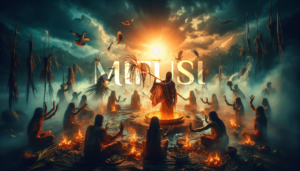
Story 3 – Dada performing exorcism
Story 3 - Dada performing exorcism Câu chuyện số 3 - Chim Đa Đa trị tà; by ThầyGià on Wed...

GLOBAL PERIL
GLOBAL PERIL (Thế giới trên bờ vực thảm họa - by Rainbow on Thu Aug 16, 2012 - translated by...

Introduction To Religious Scholar Triệu Phước.
Scholar Trieu Phuoc (born in 1948 in Tra Vinh, Vietnam) is a Tantric guru, has the name Buu Son, Duc...
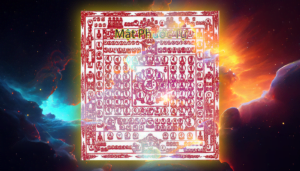
Chapter VI: VII – The Quintessence of Secret Buddhism: The five essentials Dharanis
VII. The Quintessence of Secret Buddhism: The five essentials Dharanis The Dharani: Um Lam (or just Lam). If one thinks...
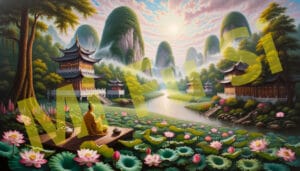
Old-Guru Self Introduction
All of the stories from Old Guru #1 thru 15 were posted at Forum: thegioivohinh Foreword: I would like to use...

THE PRECIOUS CELESTIAL SCROLL
THE PRECIOUS CELESTIAL SCROLL (Mầu nhiệm lễ thỉnh Thiên Thơ cho mẹ trước khi mất by ThuanThien on 29 Jun...
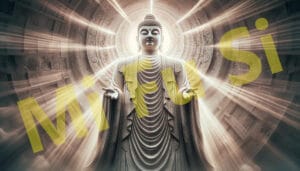
1 – MYSTICAL TALES AND ITS PRINCIPLES OLD-GURU
1 - The story about Dada the monk (not his true name): Dada is a Vietnamese with Cambodia ancestry, the...

QUINTESSENCE OF ESOTERIC BUDDHISM: PREFACE
From: Quintessence of Esoteric Buddhism (Scholar Triệu Phước-Religious name Đức Quý) 2nd edition in English 1000 prints - 2006 (first...
